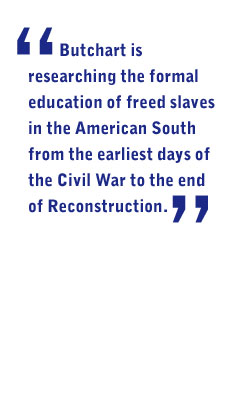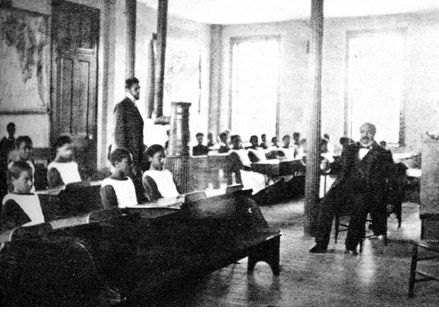


A Powerful Legacy for Black Education
by Catherine Gianaro

![]()

Intro
A common perception among many African-American students is that doing well in school is “acting white.” But Ron Butchart, a historian in the University of Georgia’s College of Education, concludes from his research that the evidence indicates otherwise.“Doing well in school,” he said, “is acting black,” and in keeping with a tradition established more than a century and a half ago.
Butchart is researching the formal education of freed slaves in the American South from the earliest days of the Civil War to the end of Reconstruction. His project, called “A Freed People’s Education: Learners, Classrooms and Teachers,” is a historical study of the teachers who worked among America’s former slaves, the schools the freed people and their teachers created, the pedagogies the teachers employed and the students they taught.

As is often the case with scholars, what started as a dissertation — in Butchart’s case, an inquiry into the ideologies of the northerners involved in freedmen’s education after the Civil War — broadened considerably and became a lifelong project. He and his team have probed everything from records of the Freedmen’s Bureau (created after the Civil War to deal with refugees, freedmen and abandoned lands) through the Southern Claims Commission (created for Southern loyalists whose property was damaged by Union forces) to Union and Confederate military and pension records. And they have dug through state archives, historical collections at city and state historical societies, city directories, and manuscript censuses returns at the National Archives. As a part of his project, Butchart has created a database of all the teachers he has found that now contains more than 11,000 teachers identified by gender, race, age when they started teaching, their prior occupation and 21 other variables.
“These data can be tapped in many ways, but what they have already revealed about the past and present of black people’s attitudes about education is overwhelming,” Butchart said. “When you go through the papers of the Freedman’s Bureau and just about any other source [on the Reconstruction Era], there’s a constant theme emerging from the freed people—a demand for access to literacy, for access to the codes of power that people acquire through literacy. Without literacy, they knew they were going to be re-enslaved in one form or another.”
For comments or for information please e-mail: rcomm@uga.edu
To contact the webmaster please email: ovprweb@uga.edu
![]()